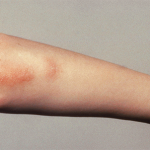“In summary, these results demonstrate the pathogenic role of IFNγ in sJIA/MAS and the therapeutic value of IFNγ neutralization in those who have failed standard therapy,” Dr. De Benedetti said.
Rituximab for Remission Induction in EGPA
Benjamin Terrier, MD, PhD, professor of medicine, Cochin Hospital, Paris, shared results from the French REOVAS trial, a phase 3 randomized controlled trial from the French Vasculitis Study Group that compared rituximab with conventional therapeutic strategy for remission induction in eosinophilic granulomatosis with polyangiitis (EGPA).10 The French guidelines recommend use of cyclophosphamide in combination with glucocorticoids when at least one poor-prognosis factor defined in the 1996 Five-Factor Score (FFS) is present.11 Alternatively, the 2021 ACR/Vasculitis Foundation Guideline recommends either cyclophosphamide or rituximab for remission induction because the comparative effectiveness for EGPA is unknown. Cyclophosphamide is preferred for patients with cardiac, severe neurologic or severe gastrointestinal involvement, or negative anti-neutrophil cytoplasmic antibody (ANCA).12
“The French REOVAS trial aimed to provide high-quality data comparing rituximab with conventional therapy in regard to superiority,” Dr. Terrier said.
In the French REOVAS trial, the primary end point was complete remission at day 180, defined as a Birmingham Vasculitis Activity Score (BVAS) of 0 and prednisone dose of less than 7.5 mg daily. The study randomized 105 patients—70% with newly diagnosed disease, 60% with an FFS of 0 and 56% with no anti-neutrophil cytoplasmic antibodies (ANCA). No statistically significant difference was found between groups in complete remission at day 180 or day 360. Subgroup analyses showed no difference in relapse-free survival according to ANCA status, disease severity assessed by the FFS or naive vs. relapsing disease. Also, no significant difference was found in average daily glucocorticoid dose or quality of life between the two arms. Serious adverse events were comparable between groups.
In summary, rituximab was not superior to conventional induction therapy in EGPA, and remission rates and relapse-free survival during the first year were comparable between the two arms.
“[Because] this was a negative superiority trial, I still think [cyclophosphamide] should be preferentially used in sicker patients. We don’t have enough data to propose rituximab as a new agent with high quality evidence. However, in young females in whom there is a fertility concern, I think it’s good to know that rituximab can be an effective therapeutic option,” Dr. Terrier concluded.
Samantha C. Shapiro, MD, is an academic rheumatologist and an affiliate faculty member of the Dell Medical School at the University of Texas at Austin. She received her training in internal medicine and rheumatology at Johns Hopkins University, Baltimore. She is also a member of the ACR Insurance Subcommittee.

